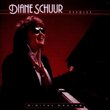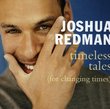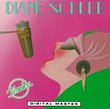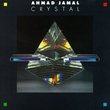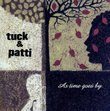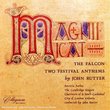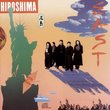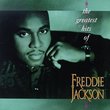| All Artists: Christian Scott Title: Yesterday You Said Tomorrow Members Wishing: 1 Total Copies: 0 Label: Concord Jazz Original Release Date: 1/1/2010 Re-Release Date: 3/30/2010 Genres: Jazz, Pop Style: Number of Discs: 1 SwapaCD Credits: 1 UPCs: 0888072314122, 888072314122 |
Search - Christian Scott :: Yesterday You Said Tomorrow
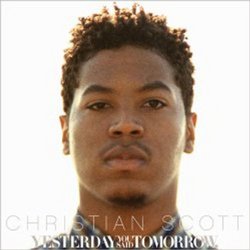 | Christian Scott Yesterday You Said Tomorrow Genres: Jazz, Pop Billboard named him one of the "faces to watch." Ebony chose him as one of the "30 Young Leaders Under 30." He has performed with the likes of Prince, Mos Def, DJ Muggs, Marcus Miller and Glen Ballard; topped the Downbea... more » |
Larger Image |
CD DetailsSynopsis
Album Description Billboard named him one of the "faces to watch." Ebony chose him as one of the "30 Young Leaders Under 30." He has performed with the likes of Prince, Mos Def, DJ Muggs, Marcus Miller and Glen Ballard; topped the Downbeat 2009 Critic's Poll for Trumpeter of the Year; and has appeared alongside George Clooney in the film Leatherheads as well as in the critically acclaimed Jonathan Demme film Rachel Getting Married. The man in question is GRAMMY nominated trumpeter Christian Scott, and on March 30, 2010, the 26 year-old New Orleans native returns with Yesterday You Said Tomorrow, his highly anticipated, all-new 10-song collection. Recorded at the renowned Van Gelder Studio in Englewood Cliffs, New Jersey and engineered by one of the greatest recording engineers in jazz history known for his work with John Coltrane, Miles Davis and Herbie Hancock, Rudy Van Gelder himself, Yesterday You Said Tomorrow marks the star trumpeter's fourth Concord release. Please take a listen to this dynamic and exciting new project. Similarly Requested CDs
|
CD ReviewsYesterday's sounds, today MV | USA | 05/11/2010 (5 out of 5 stars) "I first heard of Christian Scott, when I saw him play at the Newport JazzFest in 2006. That brief ocean-side set, was one of the highlights of the weekend. Three studio albums later, Scott is still a highlight of the contemporary jazz world. With 'Yesterday you said Tomorrow', Scott takes a more focused approach, and provides a more consistent album, than ever before. The political themes that were brewing in 'Anthem' take a center stage on this album (ie. tracks: "Angola, LA & The 13th Amendment", "The Last Broken Heart (Prop 8)") The track most people will probably steer towards, at first, is Scott's take on Thom Yorke's 'The Eraser'. This track features some stellar production, and maintains the controlled chaos of the original, while giving it a looser feel. The cover photograph gives much away, looking at it, you can tell this album takes a more simple/ no frills approach than his previous albums. Scott's music is elegant, simple and mature. An instant classic." Amazing! I was thinking about this album for days. Anthony Marray | Ohio United States | 08/29/2010 (5 out of 5 stars) "Have you ever watched a movie that slightly confused you, yet you found yourself thinking about it days later realizing you saw something amazing? Well that's the feeling I got listening to this album. I've just recently got back into listening to jazz. After years of exposure to smooth jazz muzak, I was determined to search out for a little more thought-provoking jazz. I started with the basic, Miles Davis' "Kind of Blue", which I loved. Then I started to find other incredible jazz albums like "Mingus Ah Um" and "Love Supreme". But I wanted to find really good contemporary jazz albums that evoked that feeling I got from listening to those classics. Unfortunately my search was harder than I expected. Even looking at the Top 100 in the Jazz section I found many decent jazz albums but nothing to keep me thinking about them. In other words they were unchallenging. I think the genre as a whole kind of suffers the way learning did during the Middle Ages, where you have people that reverent the past so much that they never seek to build upon it and take it in new directions. And even when some try to fuse it with more "modern" styles the music still sound stifled because the "styles" seem to take hold of the composition (I guess attempts at being crossover) rather than just influencing the works. Well you can imagine my surprise to see a jazz album in the Top Ten picks for Amazon's Music picks for 2010. I thought: `what is so different about this album from the other recently (and more popular) jazz albums released?' Just one listen to Christian Scott's cover of Thom Yorke's "The Eraser" brought me to attention. What made it stand out was the way he layered the piece with the electronic/alternative edge but maintains a "jazz" sound and mood. He doesn't play into that attempted crossover pitch. That to me was refreshing. The whole album has a style that resembles what I hear from the jazz greats, but it doesn't copy and it doesn't hold itself within a frame of what is seen as traditional jazz today. This is a very dynamic and I would say important album for jazz to me." One of the brightest young lights in jazz OffBeat Magazine | 07/10/2010 (5 out of 5 stars) "Christian Scott makes every note count. In his short but impressive career he has developed a unique instrumental identity using his "whisper technique," a method that allows him to smear notes, giving his playing a conversational texture and tremendous dynamic range. When Scott takes off with a high intensity run after a series of soft, thickly textured phrases on "K.K.P.D." his playing explodes like fireworks, or maybe like police car sirens. His understated phrasing is particularly effective when placed against the hypnotic, glistening framework assembled by his outstanding band, a unit that plays with a singular purpose and mood evocation reminiscent of Miles Davis' great '64-'68 pre-fusion quintet. The continuity of the band's sound is particularly impressive considering only drummer Jamire Williams and guitarist Matthew Stevens remain from the last album. Williams in particular is crucial to Scott's sound, playing furious bursts of percussion against the grain of the hypnotic, meditative pulse of the unit's angular propulsive sense.
Pianist Milton Fletcher, Jr. shows outstanding range, from the pensive balladry of "Isadora" to the single note architecture of Thom Yorke's "The Eraser." Scott's reading of Radiohead fits seamlessly into his own work--all he has to do is simplify the complex rhythms that populate the rest of the album--but that in itself is no surprise. Yorke's compositions have been covered by jazz artists from Michael Wolff to Brad Mehldau. What is surprising is the sense that Radiohead could probably record an album of Scott's compositions. There is very little distance between the trance dances of Scott's conception and the ambient sound of much contemporary pop. There is an unsettling, deliberate disconnect between this music--which can be by turns ethereal, extraordinarily delicate, lush, jagged-edged, otherworldly and narcotic--and the way Scott chooses to define it. These could be exotic landscapes such as Davis and Shorter conjured on E.S.P., but Scott imbues his sonic visions with titles charged with anger and despair--"Angola, LA & the 13th Amendment," "The Last Broken Heart," "Jenacide," "The American't," "An Unending Repentance." These compositions convey complex emotions that could be titled in any number of ways; if one of the brightest young lights in jazz conceptualization chooses to evoke the sense of pain and despair these titles imply, our contemporary zeitgeist must be deeply, deeply pessimistic.--OffBeat Magazine, May 2010 issue " |

